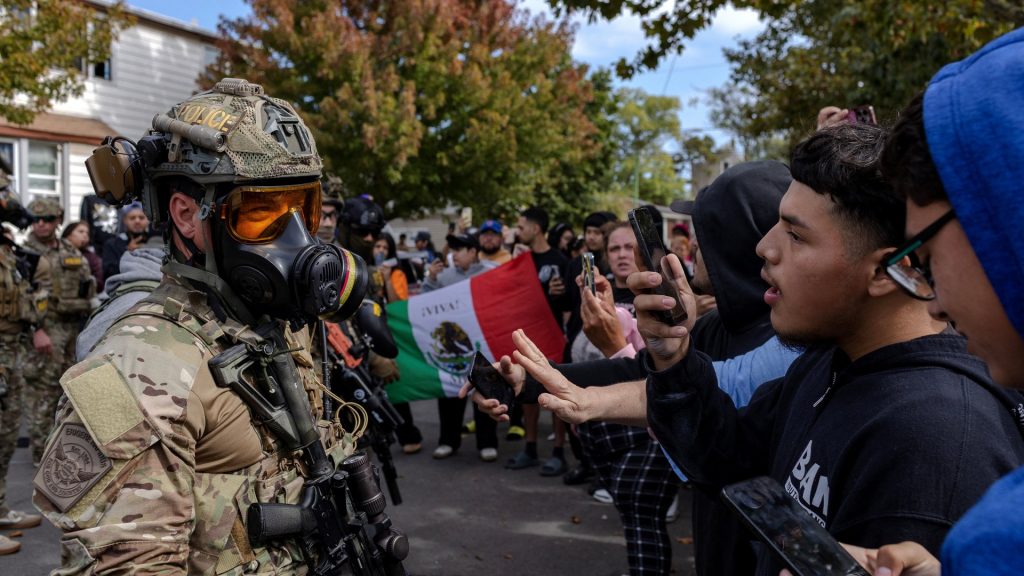Claims of ICE agents’ misconduct are rising. Can they be held responsible?

Immigration raids have increased across the nation as agents patrol city streets with a goal of detaining and deporting record numbers of people presumed to be in the U.S. illegally. But this enhanced enforcement effort has resulted in alleged assaults, car crashes, the use of so-called less-lethal munitions to fire on protesters and warrantless arrests.
Videos and personal accounts on social media detail immigration agents from the Department of Homeland Security, allegedly harming people in the Chicago area during an operation dubbed Operation Midway Blitz. The images, sometimes from Immigration and Customs Enforcement’s own accounts, show agents drawing guns on drivers, arresting people in their homes and striking a pastor in the head with a pepper bullet while he prayed.
But as the allegations grow in Chicago and elsewhere, the opportunities to seek remedy with DHS and the courts have shrunk. As one immigration scholar said, ICE’s Office of Professional Responsibility complaint line is effectively an unused dropbox.

Jim Vondruska/Reuters
“The bottom line is: There’s no accountability for ICE, either in the courts, internally or from Congress,” David Bier, director of immigration studies at the Cato Institute, a libertarian think tank, told Straight Arrow News. “The only way to protect yourself from ICE is stay away from ICE.”
His message came as ICE referred to protesters outside its Broadview, Illinois, facility and on Chicago’s streets as “rioters” who are swarming officers.
“They have assaulted law enforcement, attacked law enforcement with vehicles, thrown tear gas cans, slashed tires of cars, been arrested with firearms in their possession, blocked the entrance of the building, and trespassed on private property,” the agency said. “During this time, police under [Illinois Gov.] JB Pritzker’s sanctuary jurisdiction refused to assist federal law enforcement with violent crowds.”
SAN requested comment from DHS, ICE and the DHS inspector general’s office. None responded.
Mounting allegations
Allegations of brutality by ICE agents have mounted throughout this year, after President Donald Trump made mass deportation a priority and a top White House aide set a daily quota of 3,000 arrests of migrants.
An investigation by Willamette Week, a newspaper in Portland, Oregon, found that even first responders allegedly experienced threatening treatment from ICE officers. By examining radio records and incident reports from paramedics, the paper discovered that agents refused to let an ambulance leave the ICE facility in South Portland even though it needed to transport a patient with an upper-body injury.
The driver of the ambulance placed the vehicle in park, which caused it to inch forward, and an agent claimed the driver attempted to hit him, according to the report. The agent then threatened to shoot and arrest the ambulance driver.
“This was no longer a safe scene,” the driver later wrote, “and in that moment, I realized that the scene had not actually been safe the entire time that they were blocking us from exiting, and that we were essentially trapped.”

Jim Vondruska/Reuters
But agents are unlikely to face serious consequences after such incidents, the Cato Institute’s Bier said. Even when an ICE officer slammed a woman against a wall and onto the floor outside an immigration courtroom in New York — an incident that received widespread news coverage — he was removed from duty for only a few days. If the agency punished the officer who shot the pastor with a pepper ball, it did so in private.
“They’re being trained to violate constitutional rights, so any training they’re getting is counterproductive,” Bier said. “The normal person doesn’t think they can get away with shooting someone in the face with a pepper ball.”
The DHS Office of Professional Responsibility completes few investigations into allegations of misconduct by ICE agents, Bier said — a situation that also existed during the Biden administration.
The Cato Institute warned in August that inflating ICE’s budget in order to hire more officers would require lowering standards — and would likely increase the number of misconduct complaints. A similar outcome occurred after the Sept. 11, 2001, terrorist attacks, Cato noted. Then, as President George W. Bush’s administration combined agencies into a newly formed DHS, thousands of Border Patrol agents were hired quickly and with less vetting than normal.
According to the CATO Institute, ICE is on track to not hold officers accountable as its termination rates for disciplinary, performance and other reasons are lower than those of law enforcement in the Customs and Border Protection Office of Field Operations, the Bureau of Prisons and Border Patrol. It reported that ICE issued 3.31 terminations per 1,000 officers in 2019, while the other three subagencies had higher termination rates, ranging from 4.43 to 6.62. However, ICE is performing better than the Secret Service, Drug Enforcement Administration and the FBI, which had termination rates between 1.34 and 1.56 per 1,000 officers.
Litigating accountability
Unlike state and local law enforcement officers, federal agents are immune from lawsuits for excessive use of force or other Fourth Amendment claims.
According to the American Constitution Society, that’s because the Federal Tort Claims Act — the law that allows the public to sue federal agencies for alleged losses or harm — doesn’t permit lawsuits for all misconduct. Additionally, officers can be shielded when they engage in conduct while exercising discretion.
“Law enforcement officers rarely receive written bright line rules outlining every permissible or prohibited action,” the ACS wrote. “Federal law enforcement policies are no different.”
The Supreme Court weighed in on the issue in a case involving a family that said it was “terrorized” when an FBI SWAT team raided the wrong house. The 11th U.S. Circuit Court of Appeals, which has jurisdiction over Alabama, Florida and Georgia district courts, ruled the lawsuit could not continue because the plaintiffs failed to cite specific laws or policies that barred the agents’ actions.
The Supreme Court told the lower court to “carefully reexamine” whether the discretionary function bars lawsuits for conduct not directly written in federal laws or policies. The case is still pending.
Legal challenges of warrantless arrests by DHS
According to court documents, a consent decree bars immigration agents from arresting people without ICE warrants or probable cause. But immigrant advocates say the consent decree has not prevented warrantless detainments.
The decree was issued in 2022 as part of a settlement agreement of a class action lawsuit in which people said they were unlawfully stopped and arrested by ICE in Illinois in 2018, according to the National Immigrant Justice Center, which represented the class in the litigation.
The order extended to people arrested in the future without an ICE warrant for civil violations of the nation’s immigration laws. It was set to expire in May, but U.S. District Judge Jeffrey Cummings of the Northern District of Illinois recently extended it until next February after civil rights lawyers argued that federal agents had violated the terms of the original decree.
Cummings ordered ICE to give lawyers the number of noncitizen arrests each month, along with corresponding warrants and other information.
“ICE shall file a certification of compliance regarding its reissuance of the Broadcast and reporting of past arrests within ten business days of the entry of this Memorandum Opinion and Order (by October 22, 2025),” Cummings wrote.
ICE warrants are not the same as judicial warrants. The agency’s warrants require agents to name a specific person and state the reason for detention, and they must have a supervisor’s approval.
Bier is doubtful ICE will adhere to the order. He said the agency has violated the consent decree thousands of times.
Local, state police key in accountability
In the absence of compliance with court orders and internal affairs investigations, Bier said, local law enforcement is key in protecting the public and upholding the Constitution.
“There’s only one method of accountability at the moment, and that’s if state governments arrest ICE agents for violating constitutional rights,” he said.
That’s yet to be seen, however, even in some of the nation’s most liberal jurisdictions. But Bier said any local law enforcement officer can arrest federal agents who are suspected of committing crimes. Prosecutors and police can argue that federal officers aren’t following their duties in conducting immigration enforcement and unlawful arrests based on racial profiling and excessive use of force.
As a result, Bier said, police should arrest federal officers when they allegedly assault or hit people without justification.

Jenny Kane/AP Photo
Could Congress intervene?
It’s unlikely that Congress would hold ICE accountable, Bier said, considering that it ensured the agency would not run out of money for the next 10 years through Trump’s One Big Beautiful Bill Act.
If anything, Congress seems poised to protect ICE agents. Reps. Ashley Hinson, R-Iowa, Abe Hamadeh, R-Arizona, and Brad Knott, R-N.C., cosponsored a bill to increase penalties for assaulting, resisting or impeding an ICE officer or employee. Republicans control both chambers.
Some Democrats in Congress have spoken out. Sen. Dick Durbin, D-Ill., called the immigration enforcement in his state terrible, embarrassing and indefensible. Sen. Richard Blumenthal, D-Conn., requested information from ICE in August regarding how agents are being trained and compensated. A number of Democrats introduced bills over the summer requiring ICE to wear clear identification during enforcement actions. The bills have not been considered in committee.
Bier said such measures should not be necessary if agents followed the law and adhered to the Constitution when enforcing immigration laws.
“Those operations can happen without chaos and constitutional violations,” he said.
The post Claims of ICE agents’ misconduct are rising. Can they be held responsible? appeared first on Straight Arrow News.





